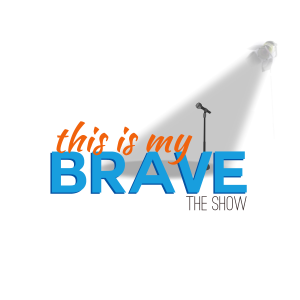If we never make it past the small talk to really open up to a friend or neighbor about our depression, or our anxiety or our eating disorder or whatever it is that we’ve hid for so long because we were scared of being judged, then how would our friend ever be able to love us as who we are?
Read moreSetting My Writing Intention
I am living proof that just because a person is living with a mental illness doesn't mean they can't work hard to manage it well and this blog is my way of giving back.
Read moreThe Neil Gaiman at the End of the Universe
“My anxiety spiked as Michael Patrick Jann, the Director of the project welcomed me to the stage. I had listened to the story several times before the event, but in the moment my mind was a blur of nervous energy….”
Read moreClarity. We all need to talk about mental illness, celebrity or otherwise
I've been thinking a lot about the post I published yesterday about my inability to relate to Kristen Bell opening up about her anxiety and depression. I don't know why it struck me to write about my feelings, but I wrote them out and put it out there, and the more I thought about what I wrote, the more I began to disagree with myself.
Sure, it's hard to relate to a celebrity because their lifestyles seem so dramatically different from the average person who struggles to pay bills or isn't able to get appropriate mental health care because they don't have insurance. But this lack of being able to identify with a famous person shouldn't have any impact on my appreciation for their ability to share their story about overcoming mental illness and stigma.
I'm sure it took a great deal of courage for Kristen to open up in that interview, the same way our This Is My Brave cast members conjure up a certain amount of bravery to audition for, and then share their stories on stage through our shows.
I'm embarrassed to admit that I think what I was feeling had more to do with envy than of not being able to empathize with a famous person sharing their story of mental illness. I'm envious that a celebrity has a much bigger platform than we do, and therefore when they share their stories they immediately garner a TON more attention than we've seen for all the hard work our organization has done over the past three years.
One of my favorite writers once wrote about envy, and I found myself re-reading her words today. Glennon reminded me today that: Envy is just unexpressed admiration. It’s respect holding its breath.
I constantly need to remind myself that we need to focus on the important work we do and that when the time is right, I'm confident our organization will attract the attention of national media. In fact, it may begin happening sooner than we thought.
This is my life's work now, this work of storytelling. My organization encourages individuals to share their stories to end the stigma. I have no right to say that a celebrity sharing her story is any less impactful than a member of my own community.
Kristen, blog reader Jill, and anyone else I may have offended from my post yesterday, please accept my apology. Thank you to all who join us in the effort to end stigma, celebrity or not.
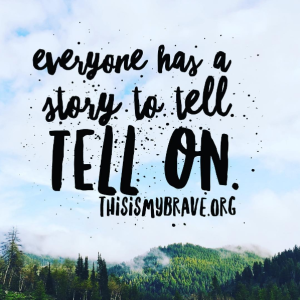
On relating to Kristen Bell's mental illness disclosure
Last week Kristen Bell became the latest Hollywood star to mention that she's not ashamed for taking medication for her anxiety and depression, and the news of her mental illness disclosure went viral. I'm grateful she used her fame to bring awareness to an issue that touches so many of us, but at the same time felt like I couldn't quite relate, even though I've been affected by the same disorders. Listen, I'm all for celebrities sharing their stories. They have platforms much, MUCH, bigger than mine, and the more people who open up, the better. The more attention we can draw to the cause, the better. The more we normalize mental illness, the better.
[embed]https://youtu.be/mYUQ_nlZgWE[/embed]
I guess I just can't really relate to a celebrity. I've never met one myself, although I'd imagine most of them are down to earth. They are human, too, after all. Albeit humans with seemingly endless streams of money, and access to practically any doctor they would ever need to see. They experience mental illness the same way the rest of the population does, only with privilege. Many of them receive the proper diagnosis, effective treatment, and manage their conditions successfully.
On the flip side, no matter how much wealth and access to care they have, some we lose to suicide, like Robin Williams.
Now let me back up for a moment and acknowledge the fact that when I experienced my most serious battles with my mental illness, it was partially my privilege which allowed me to be able to get well. I recognize this.
What I'm trying to say is that to me, when a celebrity goes on camera and talks about having gone through a mental health issue, it's not nearly as impactful as when regular people I meet through my advocacy work share their stories. It's also not the same as a celebrity figure who has made a commitment to fighting the stigma surrounding mental illness by continually sharing her story - the way Demi Lovato has. There's a big difference between mentioning the fact that you take medication for anxiety and depression, and making it part of your purpose in life to educate people.
Also, last time I checked Psychologists weren't licensed to prescribe medication.
When I started this blog my goal was to simply inspire one person not to give up. To let her know that there is life after a mental illness diagnosis and multiple psychiatric hospitalizations. That the months spent crying and sleeping and barely eating because you're so nauseous even the thought of toast turns your stomach, that all those months and maybe even years spent suffering could come to an end.
I truly believe finding other people's stories online helped me to find my recovery path. Which is why when I found the right time to begin writing out my own story, I went for it. I knew that being anonymous wasn't the answer. But at the time I felt a responsibility to my family when making the decision on whether or not to use my real name in my writing. My disclosure would affect them, too, after all.
Then, after eighteen months of blogging, I reached a point where my anonymous writing had reeled in a regular paid blogging gig for WhatToExpect.com, and I wasn't willing to go on without receiving recognition for my work. I wanted to do my part to stand up to stigma, and I knew the best way to do that was come out of the closet about my mental illness. So I did.
And none of my fears came true. The fear of losing friends, of being discriminated upon, of being looked down upon. None. Instead, the response was the complete opposite.
Which is why I am such a strong believer in the power of storytelling. Yes, I come from privilege. But in our This Is My Brave shows there are plenty of people who have come forward to share their stories and they didn't have the same access to care that I did. They still made it out of the darkness. Their stories are extraordinary.
The power behind sharing our stories lies in the ability to comfort others. In our country alone, one in five adults is living with a diagnosable mental illness. We are all affected by it, whether we realize this or not. Mental illness is mostly invisible, and because of both internal and external stigma, and the fear it instills in people, those suffering often times do not reach out for help. They feel isolated, like they are the only one who has ever dealt with that condition.
It's not true. When we share our stories openly, people suffering in silence realize they are not alone. And they see that if someone like them was able to get well, they can too.
Which brings me back to my point about celebrities. Celebrities are people just like you and me. They're human. But given the world they live in, my guess is that it's hard for an average American to relate to their stories.
I urge you to visit our This Is My Brave YouTube Channel where you can view over 100 true, personal stories of overcoming mental illness from regular, everyday people. Teachers, students, small business owners, stay-at-home-moms, community service workers, and the list goes on.
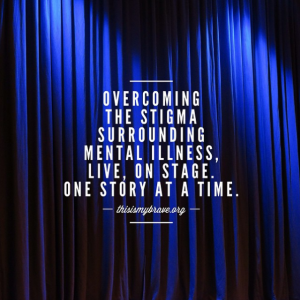
This month, for Mental Health Awareness Month, we have five all-new This Is My Brave shows on the schedule. Our Greenville, South Carolina show was this past Thursday night and it was incredible. Our Iowa City show is this coming Friday night, the third annual DC-area show is this Sunday. And finishing out the month on the same date, May 19th, are our Chicagoland and Denver shows. All our new shows will be added to our YouTube channel this summer.
Deciding to share your own struggle with mental illness is a personal choice. It's This Is My Brave's goal to inspire people to #LiveBrave which means when you're ready, and you find the right opportunity to share your experience with someone, whether privately or publicly, you will. Your ability to be brave will give the other person the comfort and solace they need to feel understood. We've seen it happen through our guest bloggers and our live show presentations. It's life-changing and extremely powerful.
Whether you get that feeling from a celebrity talking about her experience, or someone you know and love in your life, the point is that together we can dissolve the stigma surrounding mental illness by sharing our stories.
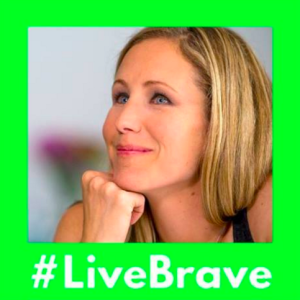 If you decide to #LiveBrave with us, we've designed an overlay you can add to your Facebook profile pic and Twitter profile pic. It's easy, simply follow the instructions here: http://twibbon.com/support/live-brave
If you decide to #LiveBrave with us, we've designed an overlay you can add to your Facebook profile pic and Twitter profile pic. It's easy, simply follow the instructions here: http://twibbon.com/support/live-brave
Letting Go of the Secret
 Photo Credit: notsogoodphotography via Compfight cc
Photo Credit: notsogoodphotography via Compfight cc
Living a life with an ever-present fear of revealing a certain secret part of yourself isn’t truly living. I know, because I’ve been there. Being caught up in an inauthentic version of myself wasn’t the way I wanted to live my life. And so I made some changes. The results were incredible.
At twenty-six years old, newly married and at the peak of my career as an agency recruiter, I was hit with mania. It came without warning, and felt exactly the same as slipping on black ice and landing flat on my back, the wind sucked out of my lungs and a searing pain pulsing through my bones. I was terrified of what was happening in my brain. I had lost control of everything and my career and reputation were on the line, not to mention my relationship with my husband who didn’t see this coming.
How would I ever recover from this mess?
I would, although recovery eluded me several times. Following my diagnosis, I spent a full year in what felt like an extended visit to a deserted island: the isle of depression. It seemed like no one could possibly understand what I was feeling. I fought waves of anxiety each morning, and would calm myself down from my afternoon anxiety by collapsing on the couch in front of the television, tears soaking the oversized pillow which my head rested on.
I saw many doctors, so many that I can’t remember most of their names. My parents pushed for second, third, fourth opinions. Not because they didn’t trust the doctor’s opinions, but because we hadn’t figured out what would bring me back to my baseline. My normal. Finally, after seeing one of the top doctors in our area, a national specialist in the study of bipolar disorder, I was ready to follow his advice, the same medication recommendation that the previous few psychiatrists had been urging me to try.
Within two months I felt better than I had felt in an entire year. Slivers of my old personality were coming back. When I laughed, it felt genuine and amazing, better than it had felt even before I became sick. When several weeks had passed and I realized I hadn’t cried, I was shocked. The drug was actually working for me.
There would be two more hospitalizations in the years that followed, only because I had taken myself off my medication during pregnancy to protect my kids. When my daughter was only 8 months old, I decided I was ready to tell my story in order to help other women who might think they couldn’t have a family because of their mental illness. I launched my blog and began writing, but kept my identity a secret because I feared the repercussions of the stigma associated with mental illness.
I kept writing and sharing my experience as a mom raising two small kids while at the same time managing my bipolar disorder and over the next year and a half, I realized that keeping my identity a secret was only adding to the stigma surrounding mental illness. It was a part of my life and I wanted to show society that I’m a real person with real emotions and I believe that people who live with mental illness should be treated like any other person living with any other life-long disease. We didn’t ask for these conditions we were dealt, and the last thing we need is for society to look the other way when we’re suffering and need support to find recovery.
I was no longer ashamed.
And so in April of 2013, I announced on my blog that I was “ready to not be anonymous anymore,” and I took a brave stand against stigma. The support that poured in from my family and friends, and people I didn’t even know but who had read my post, was overwhelming. The words of gratitude for sharing my story so courageously were like fuel to me, as I kept writing about my experiences and connecting with people who appreciated my transparency.
Six months ago I launched a project and couldn’t have imagined the response it has generated. This Is My Brave is a live theater production where people from the community will take turns at the microphone to share their story on stage via personal essays, original music and slam poetry. This Is My Brave is more than just a one-time performance. We have become a platform and a community for people living with mental illness to speak out in an effort to end the stigma associated with brain illnesses.
Our mission is to ignite and actively promote―through actions and social media― a positive, supportive national conversation about mental illness for those who live with, or love someone who lives with, a brain illness. Through the sharing of stories and experiences of those in recovery, we expect to provide a sense of community and hope; encouraging others to share their stories. We believe that each time one of us talks openly about living with mental illness, we create another crack which helps to break down the stigma. We’re currently in the process of converting to a 501(c)3 non-profit organization and have been actively planning the pursuit of our mission beyond the debut of This Is My Brave in Arlington on May 18th.
It’s time we bring mental health issues into the spotlight because they’ve been in the dark too long. Please visit www.thisismybrave.com to learn more about the show. Auditions are currently being scheduled (www.thisismybrave.com/auditions) and tickets to attend the show are on sale now at EventBrite.com.
Follow the show on Facebook, Twitter and Instagram for all the latest news!
Snow and writing
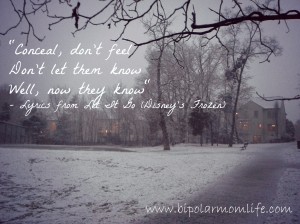 This week has been full of snow and writing. I haven't posted anything to the blog this week because I've been busy writing for Postpartum Progress since I'm a member of the Warrior Mom Editorial Team. If you haven't already seen my posts via my social media promos, I'd love for you to check them out. {Postpartum Psychosis Doesn't Equal Failing as a Mom & Psychosis During Pregnancy and What It Taught Me are the titles of my two posts.} When I hear the song from Frozen it makes me think of that time in my life when I was having babies and not taking medication in order to protect them.
This week has been full of snow and writing. I haven't posted anything to the blog this week because I've been busy writing for Postpartum Progress since I'm a member of the Warrior Mom Editorial Team. If you haven't already seen my posts via my social media promos, I'd love for you to check them out. {Postpartum Psychosis Doesn't Equal Failing as a Mom & Psychosis During Pregnancy and What It Taught Me are the titles of my two posts.} When I hear the song from Frozen it makes me think of that time in my life when I was having babies and not taking medication in order to protect them.
Seems so long ago, but it hasn't even been four years since my last episode. Back then I worked to hide what I had been going through. I've matured since then and I now know - from the tweets, comments and emails I receive from people who have read my words - that I made the right decision. Speaking out helps so many people. I'll never know how many, but my heart is content with my decision to become an advocate.
It's been a long week here with Monday being MLK Day and the little man off from school, then the snowstorm on Tuesday which led to school being cancelled for the rest of the week. I've been trying not to tear all my hair out from the "I'm-at-the-end-of-my-rope" feeling due to having to entertain a 3 and 5-yr old for four days straight. We're all getting on each other's nerves from being cooped up in the house all week. I say cooped up because for the most part I despise winter and only go out in negative wind chill weather when absolutely necessary.
Like for my therapist appointment yesterday. Couldn't ask for better timing.
I've been working on a ton of stuff for the show in May. Hard to believe it's only four months until we take the stage. Audition slots are starting to fill up and my Association Producer Anne Marie and I are thrilled to see everything coming together. If you know anyone you you think would be fabulous for the show - I'm talking creative, funny, inspirational, energetic - please have them sign up for a spot before they're gone.
I recently accepted a new writing assignment for an organization doing a tremendous amount of inspirational, educational, critical work surrounding mental health awareness. I'm honored to have been approached by them and cannot wait to share my first post with you. It's a once-a-month gig, which is definitely manageable and plus, it's an opportunity I couldn't turn down. {Sorry I broke my promise, Maria - but this is worth it!}
So yeah, a lot going on. But if I've learned anything over these last few months it's that the work eventually gets done. When the kids are calling for me to get down on the carpet and play "picnic" or board games with them, I listen. I close the laptop and grab hold of the quality time. Or when exhaustion sets in, we snuggle up on the couch and watch a movie together. Life is good. Better than good, actually. It's pretty damn amazing. (Including the occasional teachable parenting moment, which I wrote about for WhatToExpect.com recently.)
"If you are always trying to be amazing, you will never know how amazing you can be." - Maya Angelou
Planning the Future and Enjoying the Journey
 Photo Credit: Johan J.Ingles-Le Nobel via Compfight cc
Photo Credit: Johan J.Ingles-Le Nobel via Compfight cc
It can be almost dizzying to have to plan for what's ahead, but yet keep your focus at the same time on the daily details that actually may make the future happen.
There is so much written lately about staying “in the moment” and how we need to remember to cherish the everyday little events that happen to us rather than spend all our time anticipating the next big thing: graduating college, getting married, buying a house, having kids, etc, etc. I even wrote recently about how the swift tick of the clock changed me when reflecting on my daughter’s hospitalization for Kawasaki disease.
I agree wholeheartedly with this concept of fully enjoying the time in our lives that falls in-between those major life events. But things also change when you’re planting seeds. You have to set long-term goals. Write strategic plans. Manage expectations of your backers.
Because success is on the line.
I’m starting to think like a real entrepreneur and I’m loving it.
So I write big goals. I check with experts in their respected fields. I make connection after connection.
There is a chance things won’t work out. There is a chance we could fail. But the only way to prove that chance wrong is to plan. To read. To talk it through. To set the bar high. To take the leap of faith because I believe in this project and its mission.
You know how I can tell This Is My Brave is a critically needed movement? Because people tell me every day.
And it’s the passion in their voice, the stories they share with me, the emotions they trust me with which whisper to me, “Keep going!” and "What you're doing is so important!" when my thoughts run away from me and threaten to bruise my confidence.
Every time I see an email pop up in my inbox from someone saying “I stumbled upon your blog and wanted to thank you,” my heart smiles. Because I’ve touched someone to the point that they took the time to write me an email and in it they tell me about how mental illness changed their life. I can’t even tell you how much this means to me.
Maybe it was a sibling, a child, a best friend, or a parent. Usually it is the person who is writing. Mental illness affected their life in a major way and they are relieved to find another brave soul who is open to talking about their experience. And they just happened to choose me.
Friends, the reason I created This Is My Brave is to encourage conversations - like the ones that happen in my inbox - to occur in communities everywhere. I want people to not have to be afraid of talking with their families, their friends, their neighbors, their religious leaders, about what it’s like to live with mental illness. To not be afraid to ask for help. The more people open up, the bigger the impact and the more lives we’ll save.
I want people to be helped by the sharing of personal stories. And we’re doing it in an energetic, eclectic way. The essays, songs, and poetic readings you’ll experience at This Is My Brave will leave you with a new, more positive view on mental illness. There are benefits to living with some of these conditions, believe it or not. Creativity, for one. Compassion, resilience, a fierce will to figure out what will bring relief are some of the others. I know there are more, too.
We want to show you what we’re capable of. In four short months we take the stage. I’ve been cognizant of the journey and have been diligently keeping my eye on the future at the same time.
Best of both worlds, for sure.
PS. I’ve been nominated for the WEGO Health Rookie of the Year Health Activist Award! I’d be so grateful if you’d take the time to endorse me via my Nominee Directory page. It only takes a minute - simply click the link and then select the purple thumbs up button beneath my profile picture. You can endorse me once a day until February 1st when they vote. {The 3 nominees with the highest number of endorsements will be named finalists!} Thank you so much!
The Year I Learned to Jump
 Photo Credit: Jimbo N via Compfight cc
Photo Credit: Jimbo N via Compfight cc
“ALWAYS DO WHAT YOU ARE AFRAID TO DO.” - Ralph Waldo Emerson
Even in the midst of my intense wrestling match with bipolar disorder, right smack in the middle of the chaos of a frazzled mind and rattled sense of self-worth, I somehow knew one day I’d take the type of jump where there's no looking back once you launch yourself into the air.
I knew I’d face my fear.
Today, in these moments when I type here in my makeshift office and upload my words to this space which has become my launching pad for jumping off my cliff of fear, I’m opening up. Putting it all out there, no longer the only one bearing the weight the vivid flashbacks from the brunt of my struggle. I say not the only one because inevitably after I hit publish someone will respond with a “me too."
As 2013 comes to a close, I’m in the thrilling moments, body tingling from the pull of gravity after the big leap. The seconds are precious and they’re swiftly racing by like seconds on the New Year’s count-down clock, but I’m not bracing for the impact. Instead, I’m preparing to feel my toes slice through the surface of the water. {I prefer to jump in feet-first.}
Because in my dream about facing my fear, I’m on a huge cliff in Maui overlooking the deep blue ocean. Why not, right? It’s a dream.
I crave the feeling of weightlessness that comes from the adrenaline rush coursing through my body in mid-air. And I’m grabbing onto each and every one of those seconds as they fly by.
Resisting the urge to open up about my journey is almost impossible. At various times in my day-to-day activities, scenes from my first hospitalization in 2005 bubble to the surface of my memory. Or my second stint in the mental hospital. Or the third and fourth which sometimes confuse me with their shorter, more intense flashbacks. They were the times I was protecting my babies. Plus, they say the more you experience mania the less you remember. Makes sense to me now.
When mania took hold of my mind for the first time and spiraled out of control into psychosis, I spent three nights in a psych ward. Returning to the office the following Monday, I was able to gloss over my absence and say the doctor’s attributed my strange behavior to the lack of sleep and stress I was under at work. No one knew the real truth, although I’m sure there were plenty of rumors and assumptions flying while folks gathered around the water cooler on Monday morning.
I’m certain scenarios like the one I experienced happen every single day. Someone is absent from school or work for a few days or a few months and people start talking. And everything is hush, hush. Because societal norms tell us talking about mental illness isn’t the same as talking about someone who is battling cancer or severe asthma or a broken arm.
Well I have news for you: It's time we shatter those "norms."
And those of us who have fought these fights and who are still trudging through the pain and desperation and isolation that is mental illness could use the same support systems that other sick people receive.
More important to us than the flowers, cards, and meals you might send is simply your willingness to listen. To look us in the eyes and accept us for what we’ve been through, where we are right now, and what we will face each and every day and night for the rest of our lives.
Don’t be afraid to know our stories. We’re facing our fears, and we want you to, too.
Be open to us opening up. Give us hugs when we cry. Send us a laugh when you notice we’re down. If we’re too hyper, gently check in and ask if everything is on track with our treatment plan. It feels good to be acknowledged and cared for by those we love.
I have several close friends who do all these things and more and they make all the difference in the world. And of course my husband who is my better half, my voice of reason and the peace to the storm of what is inside me always knows when to step in with the right words to soothe me and keep me centered.
I will remember 2013 as the year I took the greatest leap I’ve ever taken. The year I jumped forward with sharing my words. The year I chose to only look back on the past in order to shift the future into better focus.
The year I did what I was afraid to do. And I haven’t even pierced the surface yet.
Ever been snorkeling, or better yet, scuba diving? {My husband is obsessed with snorkeling. He’s spent hours bobbing on the surface of the various tropical waters we’ve traveled to. I think it's cute.} He knows there are treasures down there. Which is why I’m so excited for my plunge into 2014 with This Is My Brave.
But first I’m looking forward to tomorrow. We're ringing in the New Year with my oldest girlfriends and their adorable kids and fun-loving husbands. It’s the 2nd annual #RomperRoomNYE2013 bash (follow along on Instagram!) and with 8 kiddos plus a 2-month old, the adults will be lucky to make it to the ball drop when we'll clink our champagne glasses with a toast to 2013 and what lies ahead in 2014.
My salute to this past year is composed of heartfelt gratitude for the support of This Is My Brave and our mission to encourage people to talk openly and often about mental health issues in their communities. The year ahead will no doubt be filled with learning experiences as I navigate unknown territories, but I am eager to grow and evolve, to bring these crucial conversations about mental illness into the spotlight.
Twenty-thirteen was the year I learned that facing my fears means enjoying the jump.
Why I Write
 Photo Credit: dawolf- via Compfight cc
Photo Credit: dawolf- via Compfight cc
I write to show the world the invisible parts of me.
I write because people need to know what mental illness looks like. It looks like me. A young mom of two feisty preschoolers with a loving husband by her side.
I write because it’s too hard for him to talk about the four times his wife slept so little her brain was buzzing out of control and he had to sign the papers. Talk with police officers. Visit the psych ward. Hold down the fort while I got well.
I write because my kids are too young to understand what their mommy experienced before they were born, when they were little. And I want them to know all of it. I’m hopeful they’ll wrap their arms around me with pride and love when they read all I’ve written.
I write because I want to make a difference. I’m over the old-school philosophy of “some things are better left unsaid.”
Said who?
The truth is, when things go unsaid, that’s when tragedies happen.
I write because I’m almost 35 and no one ever knows how much time is left. I don’t want to regret not speaking out. I want my story heard.
I write because although I’ve found the courage to disclose my illness, so many others are still suffocated by their conditions. They may be feeling defeated by the mental illness they’re battling. And they’re not quite ready to talk or write.
But once they push past the anger, the fear, the disbelief and the shame that their illness dropped onto their shoulders, there will be plenty of time for a coming out party.
They’ll combine voices to put the power of unity behind the message, take a look around and communicate how good it feels to have this weight lifted off their shoulders. A weight that never should have grown there in the first place.
I write because I found my purpose. I write to help others find their brave.
~~~~~~~~~~~~~~~
My book is now a Snippet! To read my short e-book entitled Find Your Brave {a manifesto}, click HERE to download Snippet in the Apple store. It’s the fun, new interactive way to read quick, engaging e-books.
My {In}voluntary Commitment and Why You Should Care
 Photo Credit: yyellowbird via Compfight cc
Photo Credit: yyellowbird via Compfight cc
Our bedroom door creaked slowly open at 6:35am this morning and my little man crawled under the covers next to me while my husband finished getting dressed for work. As I felt the chill of little toes brush my warm legs, I thought back to this same day, five years ago, when my mania had reached the breaking point.
I had begun to cross the threshold, going from highly manic to the inevitable psychosis, when my husband took matters into his own hands and called 911 for help.
What a stark comparison to today, I thought, as I reached into my sock drawer to fish out my psych ward socks. I pulled them on this morning as a way of honoring my past, while at the same time recognizing how far I’ve come and how I don’t ever want to go back.
~~~~~~~~~~~~~~~~~~~~~~~~~~~~~~~~~~~~~~~~~~~~~~~~~~~~~~~~~~~~~~~~~~~~~
If your father were having a heart attack, or symptoms consistent with those of a heart attack, you would rush him to the hospital where he would receive treatment. If your child had a 104 fever and was gravely ill but refused to take any medicine, you would call your pediatrician who would tell you to rush the child to the Emergency Room where he would receive medical assistance.
But if someone you loved were experiencing a mental health crisis and needed to see a psychiatrist or be involuntarily committed to a psychiatric facility to receive treatment, you wouldn’t believe the obstacles you have to surpass in order to get them the care they need to get well.
I know, because my family and I plunged head first into these roadblocks in the U.S. mental healthcare system five years ago when I was hospitalized for postpartum psychosis after the birth of my first child in 2008. Writing about this experience was something I wanted to do in order to educate people about the policies surrounding access to mental health care in the state of Virginia. {The laws vary by state. A good resource with links to studies and comprehensive information is MentalIllnessPolicy.org.}
In researching my mental illness and the treatment I received during my hospitalization, I requested copies my medical records from the hospital. I’d like to take you back to the week of October 22nd, 2008, approximately four weeks after I had given birth to my son. Belly still swollen, breasts leaking milk, I lost touch with reality during the early hours of that cool fall morning, but remained silent about my growing sense that this would be my last day on earth.
I was terrified of being taken away from my baby even though there was a little voice in the far corner of my mind urging me to go. I just didn’t want to listen.
That morning my husband knew from my past two manic episodes that I needed to be taken to the hospital. He called his mom and sister to come over and help, as we had been through this before and he knew my erratic manic behavior would require more than one person assisting in the effort to get me ready to be transferred. His next call was to dial 911, where he explained to the dispatcher that I had a bipolar diagnosis, was off my meds because of having just had a baby, and was now rapidly deteriorating and we were in need of help to get me to the hospital. He then called my psychiatrist, leaving her a message to tell her what was going on. And lastly he called my parents in Florida to alert them as well.
I remember being on the phone with my Dad while sitting on a chair in the kitchen, talking to him on speaker phone while the two female police officers who had been dispatched to our house were standing right before me. He was pleading with me to go with them. I don’t recall much, other than being afraid. I don’t know exactly how much time passed, but eventually they were able to take me, in handcuffs, under a Temporary Detention Order (TDO), to our local hospital for an evaluation.
I was clearly manic to the point of psychotic. It was well documented in the detention order paperwork that I had reported hearing voices and seeing ghosts in the baby’s room. My husband had told the officers that I had only slept 3-4 hours a night for the four nights leading up to his call for help. His sleep estimates were correct - it had been the weekend of our son’s baptism and I was trying to prepare for out-of-town guests along with getting everything ready for the party we were hosting. On top of learning to care for our new baby and suppressing the mania that I had felt since the night he had been born, it all caught up to me.
The Temporary Detention Order allowed my husband to have me sent to the hospital for an assessment. My husband was my Petitioner - the person asking that I be involuntarily committed. We were led to an empty hospital room where I was handcuffed to the metal bars of the hospital bed. My husband stayed by my side the entire time. The nurses assessed me and it was determined that there was substantial likelihood that, as a result of my mental illness, in the near future I would suffer serious harm due to a lack of capacity to protect myself from harm. I refused all meds in the Emergency room and I met the criteria for involuntary admission to a psychiatric ward of the hospital, not to exceed a 30-day stay.
I was taken by police car, still handcuffed, to our local hospital’s geriatric psychiatric ward, the nearest facility with a bed available. By the time the bed had become available, it was late at night and I remember being terrified upon entering the facility because of the Halloween decorations festively decorating the glass doors which were pulled open for me. My throat closed and I struggled to breathe, leaning all my weight back, attempting to keep them from guiding me in. They eventually coaxed me in and a young attendant began working with me to get me through the intake process. I remember her arms, covered with tattoos. Her name was Jenny.
They tried to give me drugs to force me to sleep, but my mania was so rampant and I continued to refuse oral medication, so I was given an injection to tranquilize me and my body succumbed to the rest it so desperately needed. I woke groggy, and still very ill.
The Temporary Detention Order meant I could be held involuntarily for one to five days, until a commitment hearing could be held. I was admitted the night of October 22nd, and my commitment hearing was scheduled for 9am on the 24th.
After only thirty-six hours of psychiatric care, I was still extremely sick and my mania was apparent to everyone close to me. But the chemical imbalance that was still working itself back to balanced with the help of the meds and forced rest, wasn’t severe enough to present me as a threat to myself or others during the trial, and despite my family’s strong arguments that I was not well enough to go home and care for myself, let alone a newborn, the judge still deemed me well enough to not be held against my will.
I was free to go home. Case dismissed.
My father spoke with the judge immediately following the trial’s conclusion. He was shocked and couldn’t believe the judge was going to send me home in the condition I was in. My father then asked if they (my family) were able to convince me to stay in the hospital, voluntarily, would I be able to stay?
The judge informed him that yes, I would of course be able to stay on a voluntary basis, but on the same token, I’d be able to sign myself out at any time.
This news was plenty good enough for my family and they immediately began encouraging me to stay and rest, so that I’d be able to return to my newborn baby in a much clearer state of mind. They knew that with just a few more days of treatment and solid sleep, I’d be in a significantly better place to where I could continue to see my outside psychiatrist and work on making a full recovery.
Fortunately, I was well enough to rationalize their concern for me and that was all it took to convince me to sign myself in. I stayed for three more days. My husband and dad came to visit me every day to check on my progress. They used my somewhat still disoriented state to their advantage as they were able to remind me each day that “we all needed to be in agreement that it was the right time for me to go home,” and I was too fragile mentally to process what had happened in the hearing so I followed their lead. I had signed myself in to stay and could leave when I was ready, but I didn’t really comprehend it all at the time.
I called home daily to check on my baby and asked them to bring pictures to the hospital. He changed so much in that week that I missed. His wispy brown hair on top fell out, so he had a bald head with only hair on the sides and around to the back. I cried at a picture they brought me of him smiling on his back laying on a blue and green striped baby blanket. Desperate to get back to my son, I eagerly took my meds each day and night, and did my best to be a model patient.
I signed myself out of the hospital on the 27th, after a 5-day stay, and walked into the kitchen of my house where my mom was stirring a pot of homemade chicken noodle soup cooking on the stove. I made my son a bottle of formula and sat on the couch to learn the art of bottle feeding him after having spent a month perfecting breastfeeding. I will never forget that moment. While feeding him and gazing into his eyes I silently vowed that I would do everything in my power to stay healthy for him. I never wanted to be taken away from him again.
Some people might say that involuntary commitment laws take away a person’s constitutional right to freedom. I completely disagree.
My family sought help for me because they knew I was so severely ill. The system initially determined I was a threat to myself, but the judge at the commitment hearing determined that was no longer the case. Situations like this happen all the time due to the current state of our mental health system and unfortunately, these holes in the system are what contribute to tragedies like Virginia Tech, Sandy Hook or the Navy Yard shootings. It’s the subjective “threat to themselves or others” which is determined by someone who has never met the mentally ill person, which is what needs to change.
People who are aware of family or friends who have mental health issues (and we all know someone given the statistic of 1 in 4 Americans living with a mental illness) need to be more proactive when they sense a change in someone’s behavior. By paying attention to the fragile mental states of people within our own environments, we will be able to push for help before it’s too late. The mental health laws need to be reviewed and modified to permit family and friends to have the ability to have people in trouble involuntarily committed for longer periods of time, so they are better able to make bigger strides towards recovery during the time in which they are under the hospital's psychiatric care. Until this done, we will continue to see more tragedies.
~~~~~~~~~~~~~~~~~~~~~~~~~~~~~~~~~~~~~~~~~~~~~~~~~~~~~~~~~~~~~~~~~~~~~
On this fifth anniversary of my TDO and subsequent voluntary psychiatric commitment, I’m able to smile at my son’s insistence on dressing up as a ghost for Halloween. Five years ago I was not taking my medication and therefore went through hell, reportedly saw ghosts, and thought the world was coming to an end. But today I’m cutting eye holes out of a white sheet to dress my little man up on the last day of this month. A costume which serves as a gentle reminder of my past, while allowing me to appreciate the invisible challenges which inevitably lie ahead.
Brave Because I Want To See Society Change
I learned of yesterday’s shooting here in Washington, DC, via the news pouring into my Twitter feed about the woman who had crashed her car into the gate surrounding the White House. There was speculation that a child was in the car with her at the time. There was also speculation that she suffered from mental illness.
Then she was shot by police and died soon after. The baby, thankfully, was unharmed in the ordeal and is now in the custody of child protective services.
I am so utterly heartbroken for this woman, her child, her family and friends and our society.
This needs to stop.
But unfortunately, until our country stops blaming people with mental illness for their conditions and starts providing the mental health services they need to get well, incidents like what happened yesterday will continue to occur.
We need to come together as a society to talk openly about mental health issues. If you notice someone exhibiting the signs and symptoms of a mental illness, do what you can to help them get the treatment they need. I guarantee you they are too sick to realize they need help.
We need to stop hiding our mental illnesses, because by hiding we are adding to the stigma.
Earlier this year I made the choice to go public with the fact that I live with Type 1 Bipolar Disorder. That I’ve been hospitalized a total of four times for mania, once was postpartum psychosis after the birth of my first child in 2008. That I once was afraid and ashamed to speak openly about my illness.
Today, I am neither afraid nor ashamed of my illness. I am proud to talk openly about my experiences because my openness helps others. They've told me so.
When we come together to share our stories, we propel a movement forward. A movement to shift the way people view the mentally ill. A movement to bring desperately needed changes to the state of mental health services in our country. A movement to stop the loss of innocent lives - both the mentally ill themselves and the people they harm when they are sick.
You see, yesterday’s news could have been me. I suffer from mental illness. But unlike Miriam Carey, I received proper treatment.
And with proper diagnosis and continuous treatment, people with mental illness can lead perfectly productive lives. They can be {and ARE} valuable members of society when they have the support and services they need to get well and stay well.
I don’t like to think about what could have happened if my husband hadn’t reached out for help. But the reality is that whenever a story like this hits the news and the person involved is thought to have “a history of mental illness,” I am brought right back to the torment and the excruciating emotional pain of what we went through as a family the times I was sick.
We need to change the public's misconceptions about mental illness because when people get treatment, lives can be saved.
I recently wrote a manifesto on my experience living with bipolar disorder. It's called Find Your Brave and I hope you'll take a moment to download it here and share. It's part of my effort to encourage people to stop hiding and seek support because we're so much stronger when we come together.
Let’s come together and show the world This Is My Brave.





